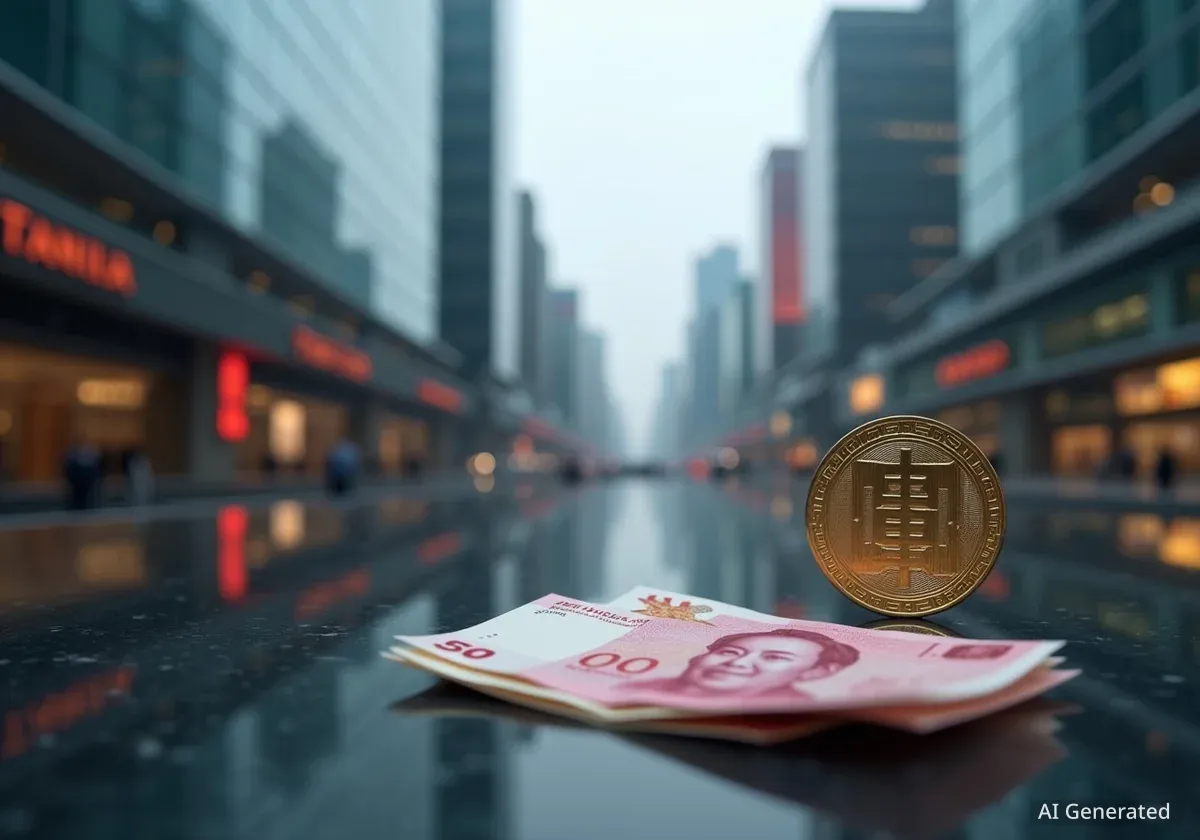China has significantly increased its investments in South Korea's government bonds, direct corporate stakes, and real estate sectors in recent months. This influx of Chinese capital, while boosting domestic investment, raises concerns among financial experts about South Korea's potential over-reliance on a single foreign source.
Key Takeaways
- China's holdings of South Korean government bonds are now more than double those of the U.S.
- Direct Chinese investment in South Korean companies surged by 147% last year, reaching a record $6.794 billion.
- Chinese ownership of South Korean listed stocks increased by 45.8% since the end of last year.
- Chinese nationals accounted for 65% of all foreign real estate purchases in South Korea last year.
- Experts warn of potential "shadow influence" and financial market instability due to concentrated Chinese capital.
China Dominates South Korean Government Bond Holdings
Data from Rep. Choi Eun-seok of the National Assembly’s Strategy and Finance Committee shows that Asian countries held 138 trillion Korean won in South Korean government bonds as of last month. This figure significantly surpasses holdings by Europe (109 trillion won), the Americas (27 trillion won), and the Middle East (14 trillion won).
The increase in Asian bond holdings was substantial, rising by 38 trillion won since the end of 2021. This growth is over five times the increase seen from the Americas, which grew by 7 trillion won during the same period.
This sharp rise is primarily driven by China. Over the last decade, China has consistently been the largest holder of South Korean bonds. Its current holdings are now more than double those of the United States, which holds the second-largest share.
Key Bond Statistics
- Asian countries' bond holdings: 138 trillion won
- European countries' bond holdings: 109 trillion won
- Americas' bond holdings: 27 trillion won
- Middle East countries' bond holdings: 14 trillion won
Diversification Strategy and Attractive Yields
China's strategy over the past ten years has involved diversifying its investments. This followed ongoing trade tensions with the United States, which led China to sell off U.S. Treasuries.
South Korea's government bonds offered attractive annual yields of around 3% (based on 10-year maturity) even during the COVID-19 pandemic. This made them a more appealing option compared to lower-interest regions like Europe and Japan, drawing significant Chinese capital.
Understanding Bond Yields
Bond yields represent the return an investor receives from a bond. Higher yields can indicate a more attractive investment, but also sometimes higher risk. South Korea's stable economy and relatively strong yields made its bonds desirable to foreign investors seeking returns.
Potential Risks of Concentrated Investment
While Chinese capital inflows offer economic benefits, a high concentration of bond holdings in a single country could lead to expanded "shadow influence." This influence could extend beyond economic matters into political and diplomatic areas.
For example, if China were to significantly sell off its South Korean bond holdings, similar to its actions with U.S. Treasuries, it could cause bond prices to fall and interest rates to rise. Such a "sell Korea" move could destabilize South Korea’s financial markets.
Rep. Choi Eun-seok stated, "It is crucial to balance funding structures to avoid over-reliance on a single source for external risk management. Reducing political and diplomatic variables will enhance predictability in our financial markets."
This highlights the importance of maintaining diverse investment sources to protect against external shocks and political pressure.
Growing Chinese Direct Investment in South Korean Companies
China has also steadily increased its direct investments in South Korean companies. Last year, China's direct investment in South Korea, including Hong Kong, surged by 147%. This reached a record high of $6.794 billion.
The Korea Institute for International Economic Policy noted that South Korea's strategic value has increased. This is due to U.S.-China technology competition and global supply chain restructuring. South Korea is seen as an important production hub and logistics center.
Digital Finance and Entertainment Sector Investments
Chinese companies are particularly active in South Korea's digital finance sector. Alipay, a major Chinese payment platform, acquired a 19.28% stake in Kakao Pay. Ant Group, another financial technology giant, secured a 37.71% stake in Toss Payments.
Beyond finance, Chinese tech conglomerate Tencent has invested in several South Korean entertainment and gaming firms. These include SM Entertainment, Kakao Games, KRAFTON, and Netmarble. These investments show a broad interest across key South Korean industries.
Significant Purchases in Stocks and Real Estate
Chinese investors have also made large-scale purchases in South Korea's stock and real estate markets.
As of last month, Chinese holdings of domestically listed stocks reached 20.49 trillion won. This marks a 45.8% increase from the 14.057 trillion won held at the end of last year. While these holdings are still below the U.S. influence (367 trillion won), the growth rate of Chinese stock investments is faster, outpacing the U.S.'s 35% increase.
Chinese Stock Holdings Growth
- Chinese stock holdings: 20.49 trillion won
- Increase from last year: 45.8%
- U.S. stock holdings: 367 trillion won
- U.S. growth rate: 35%
Real Estate Market Impact
In the foreign real estate market, China is the dominant buyer. Last year, Chinese nationals completed 11,363 real estate transactions in South Korea. This represents 65% of all foreign purchases, which totaled 17,504 transactions.
As of last month, 99,804 Chinese nationals owned real estate in South Korea. This number is expected to exceed 100,000 very soon. While this capital inflow can support the stock market, real estate investments have contributed to sharp increases in Seoul housing prices, causing some negative side effects.
Economic Implications
The influx of foreign capital into real estate can drive up prices, making housing less affordable for local residents. This creates a complex economic situation where investment is welcomed for growth, but its impact on local markets must be managed carefully.
Balancing Investment and Economic Stability
South Korea faces the challenge of balancing the benefits of foreign investment with the need to maintain economic stability and avoid over-reliance on any single country. The current trend of increasing Chinese capital across multiple sectors highlights this challenge.
Policymakers must consider strategies to diversify investment sources and manage the potential risks associated with concentrated foreign holdings. This includes monitoring market trends closely and implementing policies that promote a balanced economic environment.





